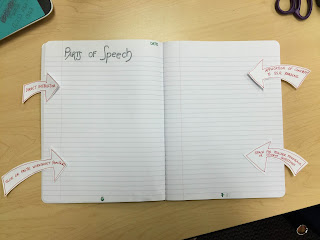Students in Ms. McDonough's class have officially finished reading the Holocaust memoir, Night, by Elie Wiesel.
Students have also focused their attention on honing and mastering many skills that are essential for success in English Language Arts.
First, students learned how to actively read a text and annotate using the following symbols:
Once students know how to actively engage in a text, they are reading to begin analyzing it. Students can first check that they understand a text by creating a summary, or the gist, of the text. This is different from a paraphrase in the following ways:
Summarizing the main ideas is only the first level of analysis; students will then use the Freitag's triangle to understand the sequence of events and the author's purpose for constructing the story as it appears.
Once students have identified the major conflict(s) in the narrative and how that conflict was resolved, they can then begin determining the author's purpose for writing and the lesson that was intended for the reader to learn. We call this theme. Remember: theme is different from plot!
Having determined the gist, plot elements, and theme of the story, students are now ready to begin communicating their ideas through writing. At PCA, we have a specific structure for creating paragraphs that we want our 8th grade students to adopt; we call it the Quote Sandwich structure for body paragraphs:
 |
| Initially, this is the requirement for a Quote Sandwich paragraph; as the year progresses, students will be asked to include even more text evidence per paragraph. |
As students become more sophisticated in their analysis of literature and the written expression of that analysis, the requirements and expectations will evolve. For now, students are really working hard to analyze and write proficiently. Next up, the complete essay!
**For Absent Notes of any of the above concepts, please contact Ms. McDonough!**


























